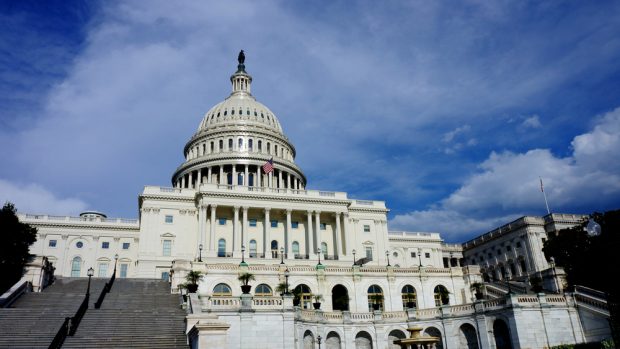 U.S. Capitol Steps
U.S. Capitol Steps
When President Trump was elected and Republicans retained Congress in 2016, you could just about hear their sabers rattling as they prepared to go to war with the CFPB.
Congress would dismantle the agency and a federal court would find the whole setup unconstitutional.
Recommended For You
That didn't happen.
To the Republicans' astonishment, the U.S. Court of Appeals for the District of Columbia said the Democrats didn't violate the Constitution when it set up the agency.
And the political realities of Republicans' dreams set in. They may have had the votes in the House to fold up Richard Cordray's shop, but they didn't have the votes in the Senate to finish the job.
Many congressional Republicans urged Trump to simply fire Cordray – even though the question of whether he could do so if Cordray hadn't done anything wrong was still tied up in federal court.
And so, rather than simply neutering the agency through a massive Dodd-Frank overhaul, they've had to do it incrementally.
And, it's been messy.
Cordray, rather than being canned, left on his own terms. More about that later.
When Cordray left, Trump appointed Office of Management and Budget Director Mick Mulvaney to serve as acting director until a permanent replacement is confirmed.
Trump may be playing games with the process and dragging the selection process out as long as possible. Mulvaney will have to leave the CFPB on June 22, unless Trump nominates someone as permanent director. Then, Mulvaney can stay until a replacement is confirmed. That promises to be a messy process.
And Mulvaney has been anything but an acting director.
What kind of acting director starts hiring agency staff?
What kind of acting director starts reorganizing the agency, folding offices he doesn't like?
What kind of acting director solicits public comment on everything but the color of the drapes in headquarters?
And then makes it clear that he intends to revisit some of the agency's most controversial issues, such as payday lending?
The kind of director who intends to stay in office for a long time.
Clearly, Trump is playing games here.
And the result is that you have an acting director who has never been confirmed for his job. You have someone who can – and has – reorganized the bureau into something that he likes.
Soft Landing for Cordray
Now back to Cordray.
He's made out pretty well for himself so far. He resigned early from the bureau to run for the Democratic nomination for Ohio governor.
And he faced what was expected to be a stiff challenge from former Cleveland mayor and former Democratic Sen. Dennis Kucinich, who also ran for president in 2004 and 2008.
Cordray won the primary on May 8 and now goes on to face former Republican Sen. Mike DeWine, who is now the state's attorney general, a job that Cordray once held.
It will be a battle between two Ohio political heavyweights.
The campaign will be one of the most closely watched contests this fall, particularly given the importance of the Buckeye State in any presidential election.
It's considered a swing state and folks will be watching to see which way it swings this time. The campaign is likely to attract big money on both sides and well-known politicians stumping for each of the candidates.
It's likely to be considered a referendum on Trump, even though he's not on the ballot this fall.
And it's likely to be a referendum on Cordray's term as CFPB director. Will voters decide that he did an effective job of reining in the bad guys? Or will they accept the GOP assertion that he abused his power as CFPB director to achieve his own goals?
And given Cordray's relationship with the credit union community, he probably shouldn't count on much support from them, although credit union folks may be happy to see him back in Ohio rather than bothering them in D.C.
The day after Cordray won the primary, Trump used his favorite means of communication, the Twitter Machine, to call Cordray a Socialist who was a "big failure in his last job."
As with a lot of things uttered by the Leader of the Free World, that comment is up for debate.
Here We Go Again
Once again, the Leader of the Free World is demonstrating his utter disdain for the United States Constitution.
Again, using his favorite form of communication, Twitter, Trump on May 9 questioned whether the credentials of news organizations that report on him critically should be revoked.
It's a theme that he has returned to over and over. He's called reporters the enemy of the state, and made fun of their looks and even the physical disability of one journalist.
He has treated the press as a bothersome nuisance. Past presidents might agree with Trump on that, but nobody since Richard Nixon has threatened journalists the way that Trump has.
This time, the threat is serious enough that Matt Drudge, usually a lapdog for the president, criticized him. And the transgression has become serious for Drudge to turn on Trump.
It seems to me that an administration so intent on defending the 2nd Amendment to the Constitution should be just as adamant in defending the document's 1st Amendment.
 David Baumann
David Baumann David Baumann is a correspondent-at-large for CU Times. He can be reached at [email protected].
© Touchpoint Markets, All Rights Reserved. Request academic re-use from www.copyright.com. All other uses, submit a request to [email protected]. For more inforrmation visit Asset & Logo Licensing.






